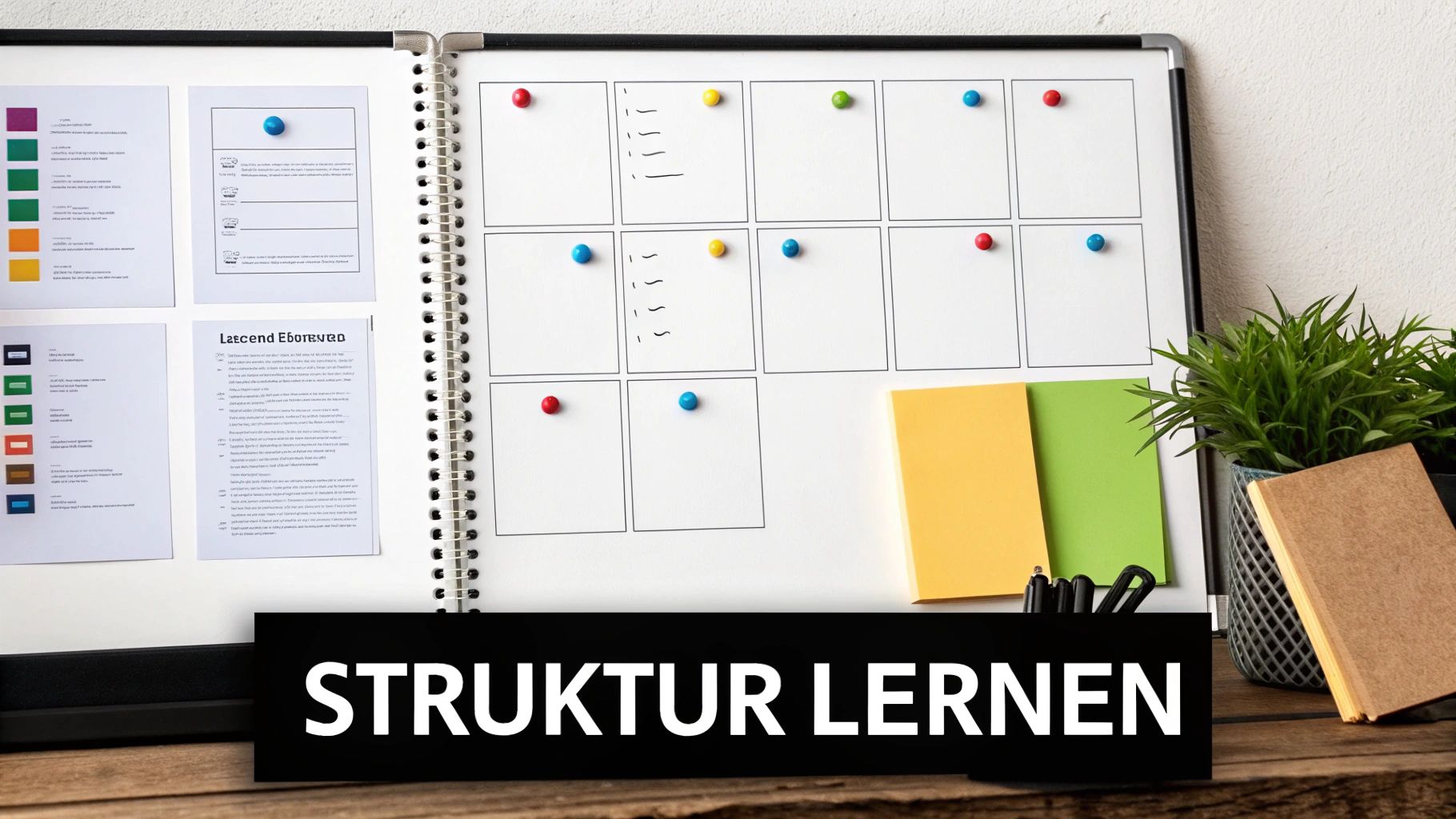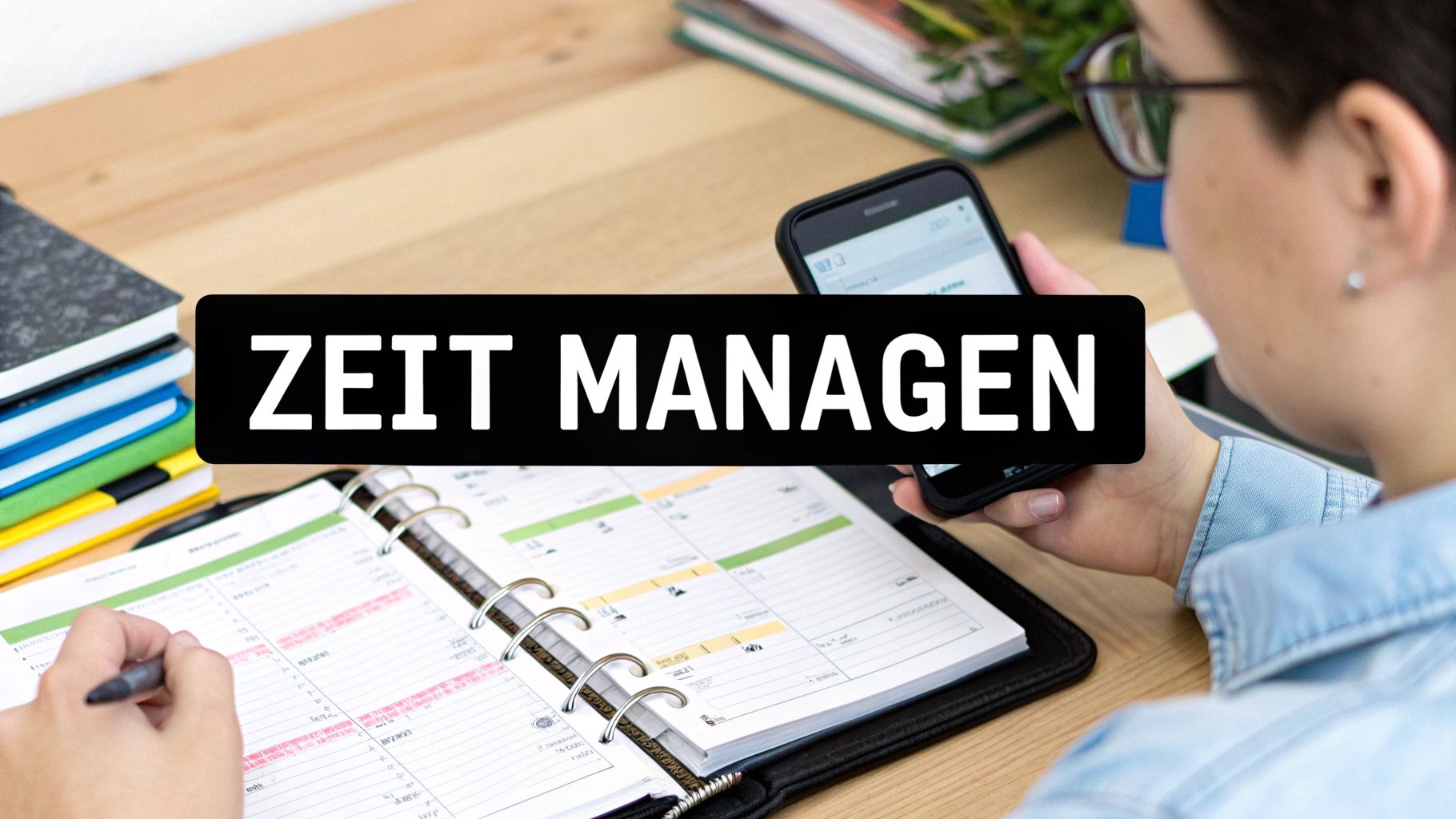Understanding the MedAT Challenge

The MedAT is the key to medical studies in Austria. For many prospective medical students, however, it represents a significant challenge . Despite intensive preparation, many applicants fail. This section helps to realistically assess the difficulty of the MedAT and to understand the reasons for the frequent failures.
The Different Test Areas
The MedAT comprises various test sections that assess different skills. These include the Basic Knowledge Test (BMS) with questions on basic scientific principles, Text Comprehension, Cognitive Abilities (KFF), which test logical thinking and problem-solving, and the Dental Aptitude Test (ZSF). Each of these areas places specific demands on the applicants.
Why do so many fail?
Thorough MedAT preparation is essential, but not a guarantee of success. Many underestimate the high level of difficulty and the enormous time pressure. The MedAT not only tests knowledge, but also resilience and the ability to perform under pressure. The medical entrance exam is a crucial step for prospective students. In 2023, 15,400 people applied for 1,850 university places. This means that statistically, 8.32 people competed for each place. Of the 15,400 registered individuals, 11,735 ultimately took the test, which corresponds to a participation rate of 76.2% . More detailed statistics on the MedAT can be found here. Another stumbling block is the test logic. It is not enough to master the material. One must understand the questions and apply the right strategies.
The Right Mindset
Besides professional preparation, the mental attitude is crucial. Successful candidates usually have a positive mindset and are resilient. They can cope with stress and setbacks . They view the MedAT as a challenge, but not as an insurmountable obstacle. They analyze their weaknesses, work on them specifically, and don't get discouraged. This proactive approach is important for success. The next section deals with learning strategies that help to master these challenges.
Learning Strategies That Really Work

Standardized learning tips often only help to a limited extent with the MedAT. This section shows promising learning methodsspecifically tailored to MedAT preparation. We highlight how successful applicants mastered complex scientific concepts and which strategies led them to success.
Evidence-Based Techniques for the MedAT
For effective MedAT preparation, evidence-based learning techniques are essential. Spaced Repetition is a method where learning content is repeated at intervals. This strengthens long-term memory retention and is particularly relevant for the BMS section.
Active Recall Training promotes the active retrieval of information through self-testing. This technique helps to quickly recall and apply what has been learned.
Visual linking methods, such as mind maps or diagrams, simplify complex issues and improve memorization.
The following table compares different learning methods and their effectiveness for MedAT preparation:
| Learning Method | Effectiveness BMS | Effectiveness KFF | Time Required | Recommended Application |
|---|---|---|---|---|
| Spaced Repetition | High | Medium | Medium | Vocabulary, Formulas, Facts |
| Active Recall Training | High | High | Low | Understanding Complex Relationships |
| Visual Linking Methods (Mind Maps, Diagrams) | Medium | High | Medium | Overview of Subject Areas, Linking Information |
The table shows that different learning methods are suitable for different test areas. Combining the methods yields the best results.
Consider your personal learning type
Everyone learns differently. Therefore, it is important to know your own learning type and adapt your learning strategies. Are you a visual, auditory, or kinesthetic learner? This knowledge helps to select the most effective learning methods and optimize MedAT preparation. You might be interested in: How to master....
Overcome learning blocks
Learning blocks frequently occur during intensive MedAT preparation. Stress, overload, and lack of motivation are common causes.
To overcome these blocks, regular breaks, sufficient sleep, and a healthy diet are important. Dividing the learning material into smaller units and setting realistic goals helps avoid feeling overwhelmed and stay motivated.
A structured learning plan and an organized learning environment promote concentration and help prevent learning blocks.
Practical examples for effective organization
A well-organized learning plan is crucial for success. Divide the learning material into manageable subject areas and schedule regular reviews . Use various learning materials such as textbooks, online courses, and practice exercises.
Create summaries and flashcardsto concisely record important information. Schedule regular time for breaks and recreation to maintain performance.
Develop your personal preparation roadmap

Time management is crucial for the success of your MedAT preparation. This section offers you a flexible frameworkto create your individual study plan. Instead of general advice, you'll receive concrete strategies and learn from the experiences of successful applicants.
Realistic self-assessment: The first step
An honest self-assessment is essential before starting your planning. Where are your strengths and weaknesses in the individual test areas? How much time can you realistically invest in MedAT preparation per week? A realistic assessment of your abilities and available time will help you to optimally utilize your resources and avoid frustration.
Weekly and Monthly Plans: Structure and Flexibility
Based on your self-assessment, you can now create your weekly and monthly plan. Divide the learning material into manageable units and set realistic learning goals.
- Schedule regular reviews to reinforce what you've learned.
- It's important to remain flexible and adjust the plan as needed.
- Life doesn't always go according to plan, so be sure to schedule buffer time!
Motivation Slumps and Study Breaks: Using Them Productively
Motivation slumps are completely normal during intensive MedAT preparation. It's important to recognize these phases and actively counteractthem. Schedule regular breaks and ensure you get sufficient rest
- Use breaks to switch off and recharge your batteries.
- Sports, hobbies, or meeting with friends can help you regain motivation.
This way you can effectively structure your learning phases and prevent burnout . Adjusting your study plan can also bring new motivation to your preparation.
Unexpected obstacles: Adaptability is key
Sometimes unexpected events occur that disrupt the study plan. Illness, family obligations, or other unforeseen circumstances can make MedAT preparation difficult. In such situations, keep calm and adjust your plan. Try to make up for lost time without overwhelming yourself. In 2024 there were 15,158 applications for 1,900 university places. Further information on MedAT statistics can be found here. These figures illustrate the high competitive pressure. Thorough preparation is therefore essential.
Progress Monitoring: Motivation and Optimization
Regular progress monitoring helps you evaluate your learning progress and optimize your study plan.
- Keep a study logto document your study times and progress.
- Analyze your results regularly and adapt your study plan to your needs.
This way you stay motivated and can optimize your MedAT preparation.
BMS and Text Comprehension: Mastering the Fundamentals

Basic scientific knowledge and the ability to quickly understand complex texts form the foundation of successful MedAT preparation. This section highlights common difficulties in the areas of BMS and Text Comprehension and provides tips for effective exam preparation.
BMS: Understanding instead of Memorization
The BMS section tests your knowledge in Biology, Chemistry, Physics, and Mathematics. Instead of memorizing everything, you should focus on understanding the concepts . It is important to recognize connections and apply what you have learned.
-
Structured Learning: Divide the learning material into small units and create flashcards. This way you can internalize important facts and formulas more easily. Focus on the core concepts first and deepen your knowledge step by step.
-
Analyzing Sample Questions: Work through old MedAT questions and analyze the solutions. This allows you to get a feel for typical questions and train your understanding of their application.
-
Practice makes perfect: Regular practice helps develop exam routine and reduce nervousness on exam day. Online resources and practice books offer the opportunity to test your knowledge and identify knowledge gaps.
The following table gives you an overview of the MedAT exam areas. It shows the number of tasks, the time limit, the difficulty level, and provides tips for preparation.
MedAT Exam Sections
In summary, structured preparation with a focus on comprehension and regular practice is key to success in the BMS section.
Reading Comprehension: Train Efficient Reading
In the reading comprehension section, you must quickly grasp complex medical texts and extract the most important information. Strategic approach is required here, not detailed reading.
-
Identify Keywords: Skim the text and highlight keywords that appear relevant to answering the questions. This saves time and helps to focus on the essential information.
-
Create Summaries: Summarize the main points of the text in your own words. This allows you to check your understanding and anchors the information in your memory.
-
Compare different approaches: Experiment with various reading techniques such as Scanning or Skimmingto find the most effective method for you. This way you can process texts faster and identify the correct answers.
Typical task formats and solution strategies
The MedAT uses various task formats in reading comprehension, for example Multiple-Choice questions, matching tasks, and drawing conclusions. Each format requires specific solution strategies. Analyze real examples and compare different approaches to find the most efficient solutions. Targeted preparation for the different task formats is crucial for success.
Besides intensive professional preparation, mental strength is also important. A positive attitude and the ability to cope with stress can make all the difference on exam day.
Targeted Cognitive Skills Training
The KFF section of the MedAT often determines success or failure. This section shows how you can systematically improve your cognitive skills – based on findings from cognitive psychology and the experiences of successful applicants. You will receive concrete training routinesthat go beyond standard exercises.
Spatial Reasoning, Memory, and Logical Deduction: Training Beyond the Standard
Many MedAT preparation courses focus on standard exercises. For real progress , however, a personalized training program is necessary, which is tailored to your personal strengths and weaknesses.
-
Spatial Reasoning: Visualize and mentally manipulate three-dimensional objects. Practice with complex puzzles, 3D software, or specialized apps. Train yourself, for example, in quickly grasping perspectives and mentally rotating figures.
-
Memory: Train your short-term and long-term memory with various techniques. Use mnemonics, memorize poems , or play memory games. Focus on the active recall of information instead of passive repetition.
-
Logical Reasoning: Solve logic puzzles, analyze chains of reasoning , and practice quickly grasping connections. Focus on identifying logical fallacies and developing sound arguments . For more information, see our guide: How to master....
Neurological Foundations and Effective Training Methods
Cognitive abilities are based on neurological processes in the brain. Through targeted training, you can strengthen and optimizethese processes. For example, when learning facts, link visual images with the information. This way, you utilize the stronger anchoring of visual impressions in memory and improve your ability to memorize. Similarly, developing mnemonicsworks to memorize complex issues more easily.
Measure Progress and Overcome Plateaus
To objectively measure your learning progress , you should regularly perform practice tests and document your results. This way, you can identify the areas in which you have improved and where further training is needed.
Plateaus are normal during the learning phase. If you are no longer making progress despite intensive training, try new learning methods or vary your training routine. Sometimes a short study breakcan also help to recharge your batteries and rediscover your motivation.
Digital Tools and Apps: Critical Evaluation and Recommendations
There are numerous digital tools and apps that promise to improve cognitive skills. However, not all of them are truly effective. Learn about the scientific basis of each app and read reviews from other users before investing time and money. Make sure the app is based on evidence-based methods and whether it can be adapted to your individual needs . Some apps, for example, offer personalized training programs that are oriented towards your learning progress.
Developing Mental Strength: The Underrated Success Factor
Good MedAT preparation goes beyond pure technical knowledge. Mental strength is crucial, because the MedAT also tests resilience. This section shows you how to build a robust mental state , cope with stress and self-doubt, and optimize your ability to concentrate – based on conversations with sports psychologists and successful MedAT applicants.
Stress Management and Anxiety Control: Techniques for the MedAT
The MedAT is a high-pressure situation. Effective stress management strategies are therefore important. Mindfulness exercises help to focus on the present moment and reduce test anxiety. Progressive muscle relaxation loosens muscles and reduces physical tension. Regular exercise and sufficient sleep are also essential for reducing stress hormones and maintaining performance. Specific breathing techniques, such as 4-7-8 breathing, can quickly bring relaxation in acute stress situations.
Self-Doubt and Setbacks: Developing a Productive Error Culture
Self-doubt and setbacks are part of MedAT preparation. It's important to view these not as personal failures, but as opportunities for learning . Analyze your mistakes, identify your weaknesses and work specifically on improving them. A positive mindset is crucial: See the MedAT as a challenge you can master. Don't compare yourself to others, but focus on your own progress. More tips can be found in our guide: How to master....
Concentration and Mental Endurance: Exercises for Success
Concentration and mental endurance are essential for the MedAT. Regular brain training with tasks that promote logical thinking, memory, and spatial reasoning can improve these skills.
-
Concentration: Practice focused attentionby concentrating on a single task for a certain period, without being distracted.
-
Mental Endurance: Increase your mental endurance by gradually extending your learning phases. Plan regular breaks to prevent mental fatigue .
The last 72 hours: Mentally optimally prepared
The last 72 hours before the MedAT are crucial for your mental preparation. Avoid intensive learning during this time. Focus on rest and replenishing your energy reserves. Review important concepts and formulas, but don't overload your brain with new information. Plan your journey to the exam location in detail to avoid stress on the day of the exam. Get enough sleep, eat healthily, and spend time on enjoyable activities. This way you'll start the MedAT relaxed and focused.
Prepare optimally for the MedAT and secure your place at university! Find out more about Animus Medicus and discover our high-quality vintage-style anatomy images: Animus Medicus